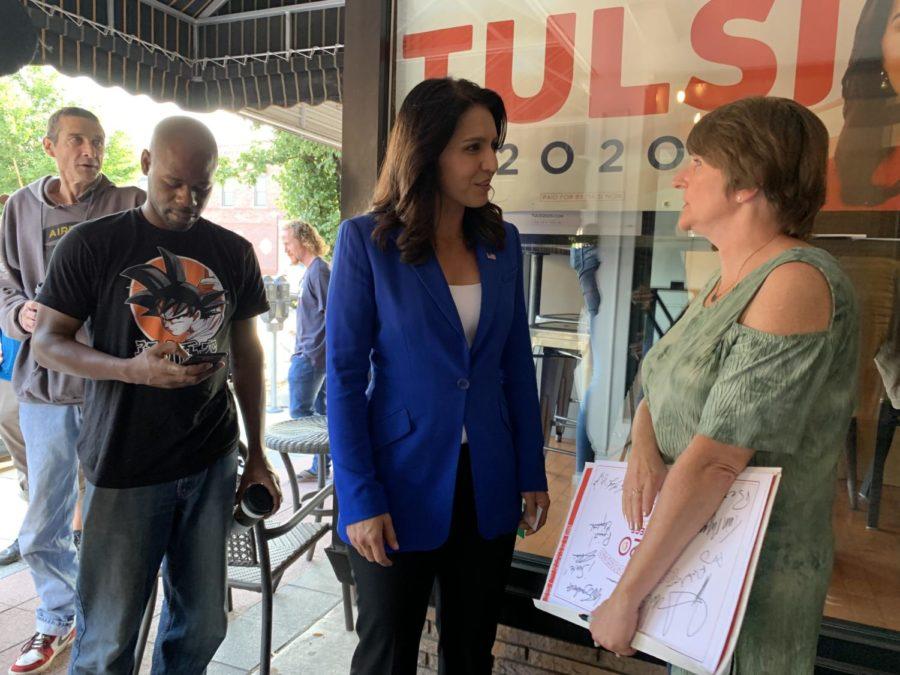Tulsi Gabbard, running anti-war campaign, vows to skip next Democratic debate
Jake Webster/ Iowa State Daily
Rep. Tulsi Gabbard, D-Hawaii, speaks with Maddie Anderson, chair of the Story County Democrats, Aug. 10 outside Cafe Diem in Ames.
December 10, 2019
Rep. Tulsi Gabbard, D-Hawaii, said she will not participate in the next Democratic presidential debate scheduled for Dec. 19, even if she qualifies for it. Instead, she will spend her time campaigning for president in New Hampshire and South Carolina.
The cutoff for qualifying for the debate is Thursday and each candidate must receive at least four percent in polls of Democratic primary voters in four national or early-voting states or six percent in two approved early-state polls. Gabbard has met the donor requirement of 200,000 unique donors, but as of Tuesday failed to meet the polling requirements.
The Gabbard campaign did not respond to an email requesting an interview for this story.
Mack Shelley, Iowa State professor and chair of the political science department, said he believes Gabbard is not as polished as the other candidates on the debate stage.
Gabbard might be avoiding the debate in the hope of maintaining good relations with the eventual nominee for a possible cabinet position, Shelley said.
“This is just a supposition, but you kind of wonder with candidates for presidential nomination, especially if they are not polling well, do they start to think of themselves as vice presidential,” Shelley said.
As the member of congress for Hawaii’s 2nd District and a veteran, Gabbard’s campaign is focused on anti-war policies, such as ending “regime change wars” and ending the “new cold war and arms race.”
Gabbard has not been able to reap the benefits of her military background compared to opponent Mayor Pete Buttigieg, D-South Bend, Ind., Shelley said.
“I think she has receded in the background, and it has been much harder to use her military experience as a way to attract support,” Shelley said. “She has been much less successful when you go by poll numbers.”
Gabbard shares similar beliefs on war with opponent Sen. Bernie Sanders, I-Vt., but Shelley said this is not an original platform and Gabbard does not have her own “shtick.”
It may benefit her to be a Democrat in her home state of Hawaii, but in battleground states such as Iowa her “far-left” policy views could hurt her, Shelley said.
“Hawaii has been a majority-minority state for a long time and Iowa is anything but, so candidates that come from places different from Iowa — which is almost everybody — it is easy to understand how they would have trouble getting acclimated,” Shelley said.
Gabbard has also had a history of being opposed to LGBTQIA+ rights, and although she has changed her views, Shelley said these past beliefs could still hurt her.
Gabbard is only 38 years old — Shelley said this gives her plenty of time to work her way up to high political positions, but her being one of the younger candidates may cause party leaders to view her as a liability.
“She is clearly on the lower-end of the age spectrum, which means she has plenty of time to evolve,” Shelley said. “There is almost a two-generation gap between those people at the top and Gabbard and Buttigieg. It’s just so painfully obvious that the ones in the center of the stage just look old.”







